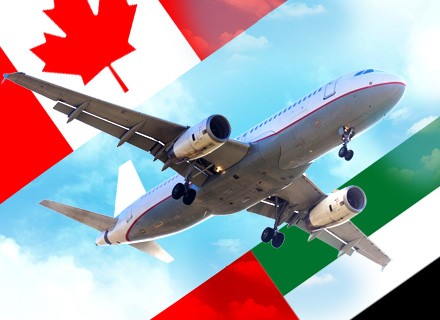An enhanced air transport agreement between the UAE and Canada has been inked to enable more flights between the two nations.
According to a statement from Canada’s Minister of Transport, Omar Alghabra, the agreement allows for 21 flights per week for each nation, which will allow for 50% more flights than the maximum number previously allowed, facilitate new routes, and give airlines more flexibility to adjust to market demand.
“Expanding the Canada-UAE air transport agreement will increase people-to-people and business linkages and Canada’s international connectivity. This is terrific news for the tourism industry and Canadians looking to build a middle-class lifestyle,” said Omar Alghabra.
Airlines can exploit the new powers under the extended agreement straight away.
The UAE is a hub for several flights to Asia, so the new arrangement is consistent with Canada’s Indo-Pacific Policy. The UAE is Canada’s most significant Middle Eastern air travel market.
The aviation transport pact between Canada and the UAE was signed in 1999, expanded in 2018, and reconvened in April 2023.
According to the statement, Canada’s ‘Blue Sky’ strategy, which promotes the growth of international aviation services and long-term, sustainable competition, was the main inspiration for the agreement’s expansion with the UAE.
Followed by the pact, Dubai’s flagship airline Emirates has decided to add two flights per week between Dubai and Toronto. From 20 April 2023, daily flights will operate on this route.
Adnan Kazim, Emirates’ chief commercial officer, said, “Emirates welcomes the expansion of the air services agreement between the UAE and Canada and we would firstly like to thank all stakeholders and authorities who were involved in this pivotal agreement that will provide a boost to the aviation and tourism sectors in both countries.”
“We have been serving customers between Toronto and Dubai since 2007, and although the double-decker A380 aircraft has been operating the route since 2009, demand arising from leisure and corporate travellers, diaspora, and students has consistently outstripped the allocated capacity. This enhanced agreement represents a turning point for us in our strategy to serve our customers better, by offering more choice and flexibility, and meet pent-up demand across our growing network,” the official stated further.
Emirates operates the flagship A380 aircraft on the Dubai-Toronto route, allowing 491 passengers across Economy Class, Business Class and First Class on each flight. With the two additional flights per week from April 2023, Emirates will offer close to 2,000 additional seats to serve the busy route, representing a 40% increase in capacity between its hub city of Dubai and the Canadian point.

